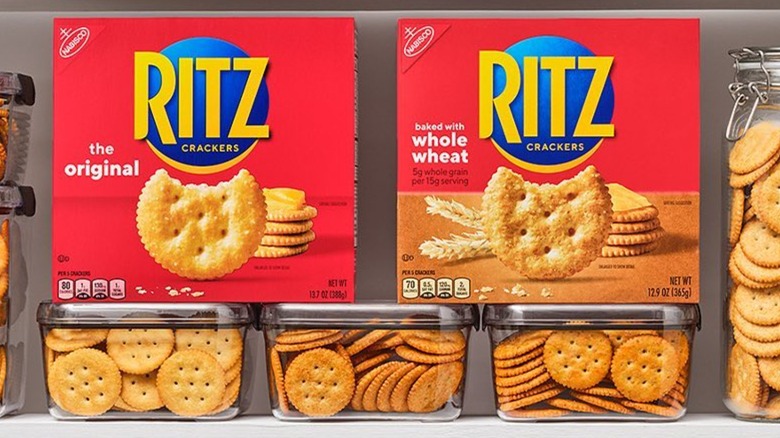The Big Way Nutrition Labels Are Changing For Ritz Crackers
As a nonprofit organization, the Center for Science in the Public Interest (CSPI) has made it a mission to work toward "an equitable food system that makes healthy, sustainable food accessible to all." Among its key missions is to get manufacturers to make their labels more transparent, so consumers can understand exactly what's inside the foods they're buying. For one, they want companies to do away with vague terms like "natural flavoring," which don't explicitly say what is in a product.
To that end, CSPI is working with snack food giant Mondelēz International on new packaging that will reveal exactly how much whole grain is in three of the manufacturer's products: Ritz "Baked With Whole Wheat" Crackers, Ritz "Baked with Whole Wheat" Fresh Stacks Crackers, and Premium "With Whole Grain" Saltine Crackers, per Food Dive. Moving forward, these boxes will specify the percentage of whole grains found in each serving of Ritz crackers. Citing data showing that many Americans strive to eat more whole grains, CSPI feels that the new labels will be critical for discerning consumers as they make their food choices.
CSPI credits the labeling changes as a step forward
Whole grains are something of a sought-after ingredient because, as the Harvard School of Public Health puts it, they offer a host of nutritional benefits, from B vitamins and iron, copper, and zinc to more gut-friendly bran and fiber than refined grains. The latter two components are especially advantageous, as they can help lower cholesterol and maintain even blood sugar levels. Moreover, fiber can even help prevent blood clots and heart attacks. However, Harvard warns that "whole grain" is sometimes used misleadingly in food marketing and labels, which are not always a real indication that the item in question is actually healthy.
CSPI is adamant that this trend needs to change and, per Food Dive, has not shied away from filing lawsuits to force food conglomerates to make their product packaging less deceiving. In a press release, CSPI litigation director Lisa Mankofsky called the organization's agreement with Mondelēz International "a significant step forward," adding that they hope "other manufacturers of whole grain products will follow suit."

